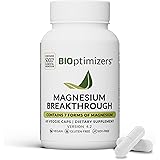BIOptimizers Magnesium Breakthrough Supplement with 500mg - 7 Forms of Magnesium: Glycinate, Malate, Citrate, and More - Natural Support for Sleep and Cognitive Function -60 Capsules- Calming Vitamins
$39.95 (as of February 22, 2026 22:27 GMT +00:00 - More infoProduct prices and availability are accurate as of the date/time indicated and are subject to change. Any price and availability information displayed on [relevant Amazon Site(s), as applicable] at the time of purchase will apply to the purchase of this product.)Therapeutic diets are typically prescribed by healthcare providers or registered dietitians and are tailored to manage specific health conditions or to prepare for medical procedures. Such diets are structured with specific nutritional and dietary guidelines that aim to manage or mitigate symptoms or risks associated with particular health conditions, such as cardiovascular disease, diabetes, or renal disorders. They might involve adjusting macronutrient intake, limiting or focusing on particular food groups or nutrients, and establishing particular dietary patterns that support the management of the health condition in question.
It’s crucial to emphasize that therapeutic diets are inherently medical in nature and should be designed and monitored by healthcare professionals to ensure safety, adequacy, and effectiveness. Depending on the health condition being addressed, therapeutic diets might involve aspects such as controlling carbohydrate intake for diabetes management, restricting sodium for hypertension, or managing protein intake for renal disorders.
The implementation and adherence to therapeutic diets can significantly influence the management and progression of various health conditions, necessitating comprehensive support, education, and possibly ongoing adjustments to meet the individual’s needs, preferences, and the evolution of their health status. Thus, a multi-disciplinary approach involving healthcare providers, dietitians, and potentially, psychologists, might be beneficial in effectively implementing and sustaining therapeutic diets.
Essential vitamins and minerals such as potassium, which is crucial for cellular function and can influence blood pressure, or Vitamin K, which plays a role in blood clotting, might be focal points in certain therapeutic diets. Additionally, omega-3 fatty acids could be prioritized in diets focused on cardiovascular health due to their potential anti-inflammatory and triglyceride-lowering effects. Each therapeutic diet would have a tailored approach to nutrient focus and restriction based on the specific health condition being addressed.



